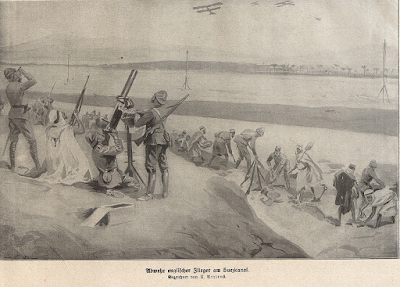opinions about army life in general and harkens back to
the Ottoman attack on the Suez Canal in 1915.//

It cannot be denied that during the most difficult times, as at Sahra-ı
Tepe when we were being tossed around and then finally alongside
the (Suez) Canal, meals and every other aspect of army life were in
better order than during the time in Palestine. You might say "even
though meals may not have been orderly in Palestine, at least there
was hot soup. Much better than the dry bisquits at the Canal."
True, at Sahra-ı Tepe there was nothing to eat other than dry bisquits
and a few dates, washed down with lukewarm water. But everyone,
from the top commander to the privates ate the same way. It was
collective misery. The relationships between officers and soldiers there
was nearly brotherly, it was so tender and sincere. The best way to
ensure compassion, respect and obedience is to create felicity.
So by transferring this family-like atmosphere to the army mess during
times of calamity and deprivation, all of these virtues are increased and
soldiers' willingness to make the requisite sacrifices multiplies, as well.
In order to understand this ferver, one need only look at the astonishing
strength the army displayed when soldiers were sunk in the sand up to
there knees, hungry and thirsty, on their way to the Canal.

Ottoman attack on the Suez Canal, 1915.
How about the food situation in the final days in Palestine? Meat, rice,
baklava, börek - everything was available. But not for everyone in the
same degree. While some at the front filled their stomachs with boiled
wheat or flour soup, others enjoyed steak and sweets and drank iced
'hoşaf'. And it wasn't just the Germans who ate well. Some of our
fellows did, too.
There were some detachments that fed their troops well and paid them
in gold and silver, but there were others that had a hard time finding
even flour soup for their soldiers and paid them with paper money
that was essentially worthless in Arabia. Yet, they were all soldiers
fighting for the same cause and enduring the same deprivations. Some
were relatively happy with lots of good food and other were in the
complete opposite situation.
If one needs to look for the reasons for defeat and weakness, look no
further. The sadness and despair that such unseemly inequalities
engender diminish the orderliness, obedience and respect that are the
essential elements of an army, and hunger devastates a soldier.
//END of PART VII//

Hiç yorum yok:
Yorum Gönder